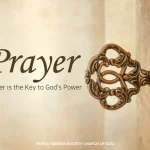IN DAYS OF HIS POWER SERIES.
TOPIC: IF THOU O LORD SHOULD MARK INIQUITIES, WHO SHALL STAND?
COMPILED/EDITED BY-:
Rev. Innocent Chukwudi Peace Udochukwu
President Living Fountain Ministries Int’l LIFOM
“If thou, LORD, shouldest mark iniquities, O Lord, who shall stand? But there is forgiveness with thee, that thou mayest be feared.”
— Psalm 130: 3-4
NOTE, dear friends, that the Psalm begins with this remarkable expression, “Out of the depths have I cried unto thee, O Lord,” and I call your special attention to that utterance of the psalmist because there are many who are afraid to pray when they are in the depths of soul-despair. It is comparatively easy to think you are praying when you have a fine notion of your own excellence. At such a time, you can stand up in the temple, with the boasting Pharisee, and pour out, as glibly as possible, expressions which you call prayer, but which God will never accept. But the very best prayer in all the world is that which comes from a broken heart and a contrite spirit, — when, away in the corner there, beside the conscience-stricken publican, we smite upon our breast, and cry, “God be merciful to me a sinner.” Do not, I beg you, think that your prayer will not succeed because you are in the depths. There is no place for praying like that; if ever a man is more sure to succeed with God at one time than at another, it is when he is in his greatest straits. You know that men, who are wisely generous, when they are about to distribute their alms, like to give to the most necessitous cases. The plea with them is the greatness of need, the urgency of distress; and it is just so with God and yourselves. It is not your goodness that will ensure an answer to your prayer; it is the greatness of your need. Even if you have sunk very low in your own esteem, till not a ray of hope seems left to you, and you are shut up in the blackest darkness of despair, now is the very time for you to pray, even as the psalmist said, “Out of the depths have I cried unto thee, O Lord.” No prayers are more true, more real, and, consequently, more acceptable, and no prayers are so likely to be quickly answered, as those that come up from the very depths of soul-distress. I begin my discourse with this observation, because I want to cheer some of you who at present hardly dare to pray. Yet you are the very people who may pray; you who think that the Lord will never hear you are the people whom he is certain to hear and answer. When you are cleaned right out, when even the last rusty counterfeit farthing has been emptied out of your pocket, and you stand before your God as a wretched, starving, and bankrupt beggar, your abject poverty and dire need will commend you to his mercy and love. Now, — if never before, — now that you have come to your worst, dart up to heaven your prayer; and the Lord, who heard Jonah when he was in the whale’s belly, and Manasseh when he was in captivity in Babylon, will hear you, and send you a speedy answer of peace to your supplication.
“If thou, Lord, shouldest mark iniquities, O Lord, who shall stand?” That is a confession. Now, confession must always come before absolution. “If we confess our sins, he is faithful and just to forgive us our sins.” If we try to cloak our sin, “if we say that we have no sin, we deceive ourselves, and the truth is not in us,” and no pardon can come from God to us. Therefore, plead guilty, plead guilty. Thou oughtest to do it, for thou art guilty. Thou wilt find it wisest to do it, for this is the only way to obtain mercy. Cast thyself upon the mercy of thy Judge, and thou shalt find mercy; but first acknowledge that thou needest mercy. Be honest with thy conscience, and honest with thy God, and confess thine iniquity which thou hast done, and mourn over the righteousness to which thou hast not attained.
You notice that this confession is recorded with a kind of grave astonishment: “If thou, Lord, shouldest mark iniquities, O Lord, who shall stand?” This is as much as for the psalmist to say, “I And am sure that I cannot, and who can?, my dear brothers and sisters, if God shall deal with us according to our iniquities, where shall we stand, and who among us shall stand anywhere? I dare not stand to preach if God shall judge me according to my iniquities. You dare not stand to sing; what have you to do with singing if God is marking your iniquities? I wonder that men can stand at their counters, and stand at their work, while their sin is unforgiven. And then how shall we stand in the day of judgment? The best saint on earth, if he stands in his own righteousness alone, and is judged according to his own offences, why, the justice of God will blow him away like the chaff, or consume him as with a flame of fire. “If thou, Lord, shouldest mark iniquities, O Lord, who shall stand?”
It is a dreadful fact that this “if” is no “if” to those who are not believers in Christ, but it is a matter of terrible certainty. God does mark the iniquities of you who are unbelievers. Although as yet he does not visit them upon you, else you could not stand, yet he sees them, and he records them. As gold and silver are put into a bag and sealed up, so are your iniquities. All the transgressions of your past life are in the book of record, from which they never can be blotted except by one gracious hand. Would to God that you would accept pardon from that pierced hand! But, apart from that, your iniquities are engraved as in eternal brass, and in that day when the forgotten things shall be brought to light, all the sins that now lie at the bottom of the sea of time shall be cast up upon the shore, and all shall be seen, and every secret thing shall be set in the light of day, and every transgression and iniquity shall be revealed by the light of the great white throne, and the ungodly shall be punished for all their ungodly words and ungodly deeds and ungodly thoughts according to the rules of equity in that last day of assize. O sirs, God will mark iniquity, and then, who that is out of Christ shall be able to stand? Who that has never hidden in the riven Rock of Ages shall find any shelter then? Nay, shall they not all cry to the mountains to fall upon them, to hide them from the dreadful face of him who shall sit upon the throne of God? Even at this time there are some in this house of prayer whose sins are lying upon them, and whose transgressions are written in God’s book of remembrance? How can they dare to stand even before a throne of grace, and how will they stand before the throne of judgment?
“Out of the depths have I cried unto thee, O LORD.”
This is the Psalmist’s statement and plea: he had never ceased to pray even when brought into the lowest state. The depths usually silence all they engulf, but they could not close the mouth of this servant of the Lord; on the contrary, it was in the abyss itself that he cried unto Jehovah. Beneath the floods prayer lived and struggled; yea, above the roar of the billows rose the cry of faith. It little matters where we are if we can pray; but prayer is never more real and acceptable than when it rises out of the worst places. Deep places beget deep devotion. Depths of earnestness are stirred by depths of tribulation. Diamonds sparkle most amid the darkness. Prayer de profundis gives to God gloria in excelsis. The more distressed we are, the more excellent is the faith which trusts bravely in the Lord, and therefore appeals to him, and to him alone. Good men may be in the depths of temporal and spiritual trouble; but good men in such cases look only to their God, and they stir themselves up to be more instant and earnest in prayer than at other times. The depth of their distress moves the depths of their being; and from the bottom of their hearts an exceeding great and bitter cry rises unto the one living and true God. David had often been in the deep, and as often had he pleaded with Jehovah, his God, in whose hand are all deep places. He prayed, and remembered that he had prayed, and pleaded that he had prayed; hoping ere long to receive an answer. It would be dreadful to look back on trouble and feel forced to own that we did not cry unto the Lord in it; but it is most comforting to know that whatever we did not do, or could not do, yet we did pray, even in our worst times. He that prays in the depth will not sink out of his depth. He that cries out of the depths shall soon sing in the heights.
“Lord, hear my voice” It is all we ask; but nothing less will content us. If the Lord will but hear us we will leave it to his superior wisdom to decide whether he will answer us or no. It is better for our prayer to be heard than answered. If the Lord were to make an absolute promise to answer all our requests it might be rather a curse than a blessing, for it would be casting the responsibility of our lives upon ourselves, and we should be placed in a very anxious position: but now the Lord hears our desires, and that is enough; we only wish him to grant them if his infinite wisdom sees that it would be for our good and for his glory. Note that the Psalmist spoke audibly in prayer: this is not at all needful, but it is exceedingly helpful; for the use of the voice assists the thoughts. Still, there is a voice in silent supplication, a voice in our weeping, a voice in that sorrow which cannot find a tongue: that voice the Lord will hear if its cry is meant for his ear. Let thine ears be attentive to the voice of my supplication. The Psalmist’s cry is a beggar’s petition; he begs the great King and Lord to lend an ear to it. He has supplicated many times, but always with one voice, or for one purpose; and he begs to be noticed in the one matter which he has pressed with so much importunity. He would have the King hearken, consider, remember, and weigh his request. He is confused, and his prayer may therefore be broken, and difficult to understand; he begs therefore that his Lord will give the more earnest and compassionate heed to the voice of his many and painful pleadings. When we have already prayed over our troubles it is well to pray over our prayers. If we can find no more words, let us entreat the Lord to hear those petitions which we have already presented. If we have faithfully obeyed the precept by praying without ceasing, we may be confident that the Lord will faithfully fulfil the promise by helping us without fall. Though the Psalmist was under a painful sense of sin, and so was in the depth, his faith pleaded in the teeth of conscious unworthiness; for well he knew that the Lord’s keeping his promise depends upon his own character and not upon that of his erring creatures.
“If thou, LORD, shouldest mark iniquities, O Lord, who shall stand?”
If JAH, the all seeing, should in strict justice call every man to account for every want of conformity to righteousness, where would any one of us be? Truly, he does record all our transgressions; but as yet he does not act upon the record, but lays it aside till another day. If men were to be judged upon no system but that of works, who
among us could answer for himself at the Lord’s bar, and hope to stand clear and accepted? This verse shows that the Psalmist was Under a sense of sin, and felt it imperative upon him not only to cry as a suppliant but to confess as a sinner. Here he owns that he cannot stand before the great King in his own righteousness, and he is so struck with a sense of the holiness of God, and the rectitude of the law that he is convinced that no man of mortal race can answer for himself before a Judge so perfect, concerning a law so divine. Well does he cry, “O Lord, who shall stand?” None can do so: there is none that doeth good; no, not one. Iniquities are matters which are not according to equity: what a multitude we have of these! Jehovah, who sees all, and is also our Adonai, or Lord, will assuredly bring us into judgment concerning those thoughts, and words, and works which are not in exact conformity to his law. Were it not for the Lord Jesus, could we hope to stand? Dare we meet him in the dread day of account on the footing of law and equity?
“But there is forgiveness with thee”. Blessed but. Free, full, sovereign pardon is in the hand of the great King: it is his prerogative to forgive, and he delights to exercise it. Because his nature is mercy, and because he has provided a sacrifice for sin, therefore forgiveness is with him for all that come to him confessing their sins. The power of pardon is permanently resident with God: he has forgiveness ready to his hand at this instant. “That thou mayest be feared.” This is the fruitful root of piety. None fear the Lord like those who have experienced his forgiving love. Gratitude for pardon produces far more fear and reverence of God than all the dread which is inspired by punishment. If the Lord were to execute justice upon all, there would be none left to fear him; if all were under apprehension of his deserved wrath, despair would harden them against fearing him: it is grace which leads the way to a holy regard of God, and a fear of grieving him.
There is forgiveness first, and then the fear comes afterwards. All the fear in the world that is worth having is the result of pardoned sin. The fear that is not to be cast out, the fear that hath no torment in it, is that fear which comes of a sense of every iniquity being blotted out. I charge you, believe in Jesus Christ. In the name of Jesus of Nazareth, I say to you unbelieving ones,— Believe in him now. Rise, take up your bed, and walk. I, who have no power whatever of myself, yet speaking in my Master’s name, know that his power will go with his gospel, and that his word shall not return unto him void. Believe and live. God bless you, for Jesus’ sake! Amen.
SHALOM
FOR MORE SPIRITUAL INSIGHT/PRAYER REQUESTS 🙏 PLEASE CONTACT US AT:
RHEMA PRODUCTIONS TV ABUJA NIGERIA
PHONE: +2348033083732
EMAIL: revinnopeace@gmail.com
WEBSITES: www.rhemaproductionstv.com, www.rptvblog.com















More Stories
The Power of a Mind Illuminated by the Light and Word of Christ
Cutting Off the Horns of the Wicked: A Biblical Exploration of Psalm 75:10
Refined with Afflictions in God’s Refinery